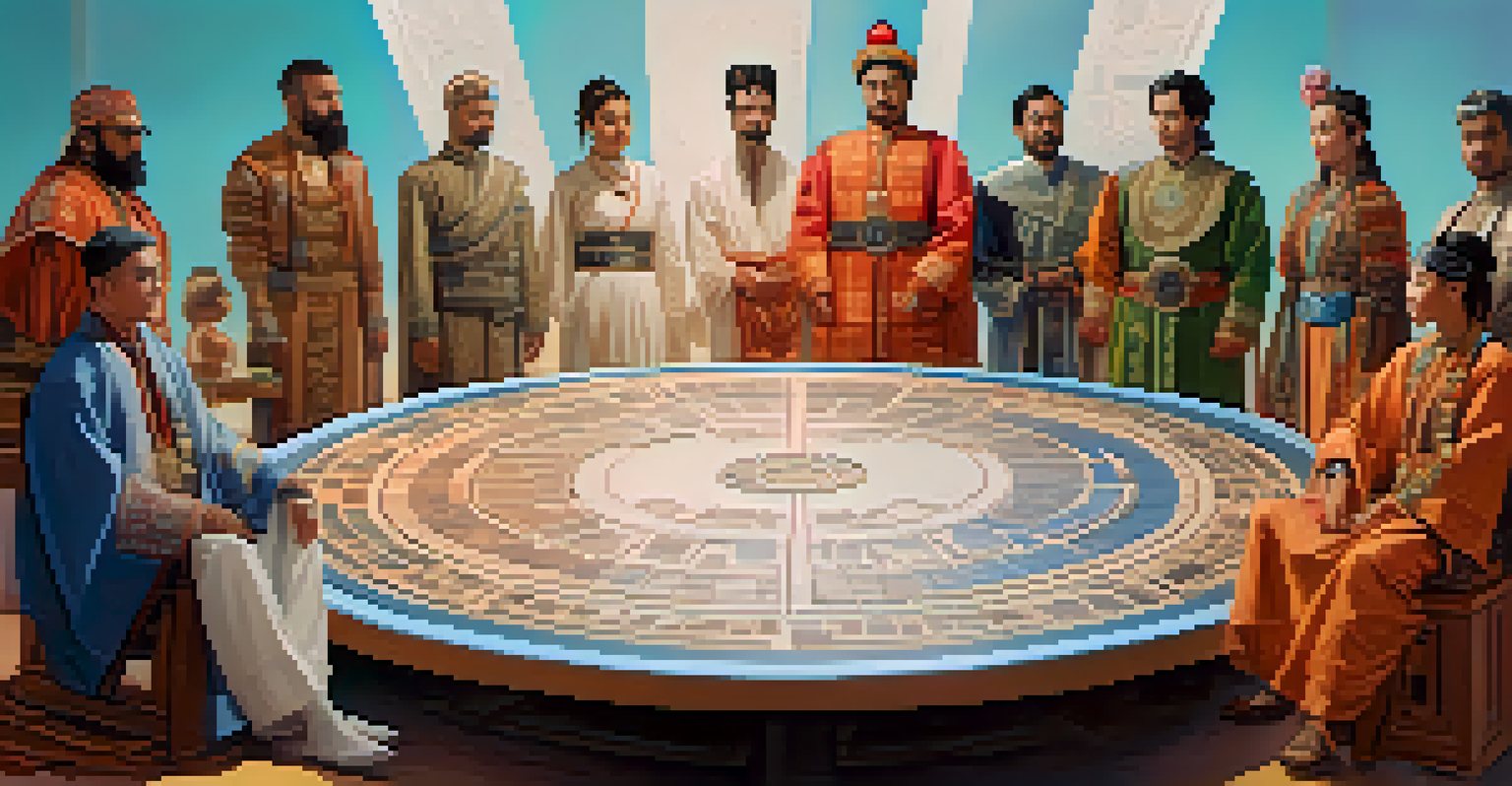Cultural Perspectives on AI Ethics: A Global Overview

Understanding AI Ethics Through a Cultural Lens
AI ethics isn't a one-size-fits-all concept; it varies significantly across cultures. Each society brings its own beliefs, values, and norms to the discussion, shaping how AI is perceived and implemented. For example, Western cultures often emphasize individual rights and autonomy, while many Eastern cultures may prioritize community welfare and harmony.
Ethics cannot be based on religion, nor can they be based on science alone. Ethics must be based on the values we hold dear as individuals and as members of society.
This divergence leads to different ethical frameworks for AI development and usage. In countries like the United States, there's a strong focus on transparency and accountability, whereas in others, like China, collective benefits might take precedence over individual privacy concerns. Understanding these cultural contexts is crucial for developing AI systems that are ethically sound globally.
Ultimately, recognizing these varied perspectives helps foster dialogue among nations, paving the way for a more inclusive approach to AI ethics. By appreciating how different cultures influence ethical considerations, stakeholders can work toward solutions that respect diverse values and promote collaboration.
Western Perspectives: Autonomy and Individual Rights
In Western cultures, particularly in Europe and North America, discussions around AI ethics often revolve around the concepts of autonomy and individual rights. The emphasis is on ensuring that AI systems respect personal freedoms and do not infringe upon individual privacy. This is evident in the implementation of regulations like the General Data Protection Regulation (GDPR) in Europe, which aims to protect citizens' data rights.

Moreover, there's considerable concern about bias in AI algorithms, which can perpetuate existing inequalities. Activists and ethicists argue for transparency in AI systems to ensure fairness and accountability, promoting an ethical landscape where technology serves everyone equally. This approach prioritizes the need for ethical frameworks that safeguard users from potential exploitation or harm.
Cultural Variations in AI Ethics
AI ethics varies significantly across cultures, influencing how technology is perceived and applied globally.
However, this focus on individualism can sometimes overlook the importance of community and collective values. As AI continues to evolve, it’s crucial for Western perspectives to engage with alternative viewpoints, ensuring a balanced approach that incorporates diverse ethical considerations.
Eastern Perspectives: Community and Collective Well-Being
In many Eastern cultures, including those in Asia, the approach to AI ethics often emphasizes community welfare and collective well-being over individual rights. This perspective prioritizes harmony and societal benefits, viewing technology as a tool for enhancing the common good. For instance, countries like Japan and South Korea actively integrate AI into public services to improve quality of life for all citizens.
The greatest danger in times of turbulence is not the turbulence; it is to act with yesterday's logic.
This cultural viewpoint raises interesting questions about privacy and data use. While Western cultures may see strict data protection as essential, Eastern societies might prioritize the greater good achieved through data sharing. This can lead to innovative applications of AI that address societal challenges, such as urban planning and healthcare, by pooling data for better outcomes.
However, this collective focus also raises ethical dilemmas regarding individual consent and autonomy. As AI systems become more prevalent, it’s important to find a balance that respects both community values and individual rights, ensuring that technology serves to uplift society without compromising personal freedoms.
Indigenous Perspectives: Integrating Tradition and Technology
Indigenous cultures offer unique insights into the ethical implications of AI, emphasizing the importance of tradition, community, and a deep connection to the land. Many Indigenous groups advocate for the integration of cultural values into technological advancements, ensuring that AI respects their ways of life and worldviews. This perspective fosters a holistic view of technology, where AI is seen not just as a tool, but as part of a broader ecosystem.
For Indigenous peoples, the use of AI raises critical questions about ownership, representation, and cultural appropriation. There is a strong push for AI systems to be developed in collaboration with Indigenous communities, ensuring that their knowledge and rights are respected. This approach not only empowers these communities but also enriches the development of ethical AI practices that are culturally sensitive.
Balancing Individual and Collective Needs
Western perspectives prioritize individual rights, while Eastern views often emphasize community welfare, highlighting the need for a balanced approach.
As the conversation around AI ethics evolves, it’s essential to include Indigenous voices to create a more inclusive framework. By valuing traditional knowledge alongside technological innovation, society can develop AI systems that are not only effective but also respectful of diverse cultural heritages.
The Role of Religion in Shaping AI Ethics Globally
Religion plays a significant role in shaping cultural perspectives on AI ethics. Different religious beliefs influence how communities view technology, morality, and the implications of AI on human life. For instance, in many faith-based communities, the moral implications of AI, such as its impact on human dignity and the sanctity of life, are critical considerations.
In various cultures, religious teachings may advocate for caution in the adoption of AI, emphasizing the need to ensure that technology aligns with ethical and moral values. This can lead to a more cautious approach to AI development, where the focus is not solely on innovation but also on fostering a sense of responsibility towards humanity and the environment.
Engaging with religious perspectives can enrich the dialogue around AI ethics, providing a deeper understanding of the values that different cultures hold dear. As technology continues to advance, integrating these diverse viewpoints can help create a more ethical framework that resonates with various belief systems.
Global Collaboration: Bridging Cultural Gaps in AI Ethics
The diversity of cultural perspectives on AI ethics highlights the necessity for global collaboration. As AI technology transcends borders, it's essential for countries to engage in dialogue that respects and incorporates various ethical frameworks. Initiatives like the Global Partnership on AI illustrate how nations can work together to address shared challenges while respecting cultural differences.
Collaborative efforts can lead to the establishment of universal ethical standards that acknowledge cultural nuances. By fostering partnerships between governments, tech companies, and civil society, stakeholders can share best practices and develop guidelines that are both effective and culturally sensitive. This approach not only enhances trust among nations but also promotes responsible AI development worldwide.
Global Collaboration for Ethical AI
Engaging in global dialogue and collaboration is essential to bridge cultural gaps and establish inclusive ethical standards for AI.
Through open dialogue and mutual respect, global collaboration can bridge cultural gaps, leading to a more comprehensive understanding of AI ethics. As we navigate the complexities of technology, working together will ensure that AI serves humanity in a way that is equitable and just for all.
The Future of AI Ethics: A Cultural Synthesis
Looking ahead, the future of AI ethics will likely involve a synthesis of diverse cultural perspectives. As the world becomes increasingly interconnected, there's a growing recognition that a singular ethical framework may not suffice. Instead, a more inclusive approach that draws from various cultural insights can lead to a richer understanding of ethical AI.
This cultural synthesis can help address pressing issues such as bias in AI algorithms, privacy concerns, and the societal impact of automation. By integrating different viewpoints, stakeholders can develop solutions that are not only technically sound but also culturally relevant. This collaborative spirit can foster innovation while ensuring that ethical considerations remain at the forefront of AI development.

Ultimately, the goal is to create AI systems that benefit all of humanity, respecting the rich tapestry of cultural values that exist around the globe. As we move forward, embracing this cultural diversity will be key to navigating the ethical landscape of AI in a way that is inclusive and just.